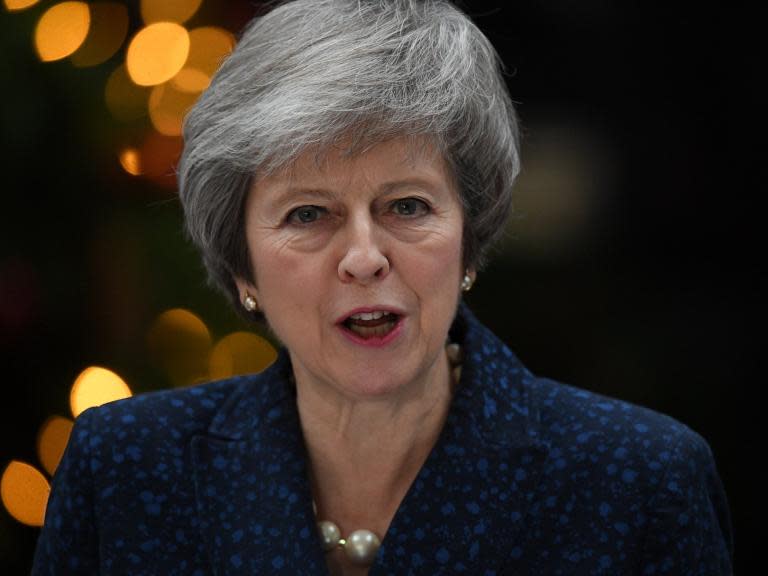Theresa May hints she will quit before next election in bid to win no-confidence vote
Downing Street has raised the prospect of Theresa May resigning before the next election, as she desperately tries to save her job ahead of a vote of no confidence.
The prime minister’s spokesman said she did not regard the vote tonight as deciding who is going to lead the party into the next election, but about who takes the country through Brexit.
The key argument her critics have used against her remaining as leader, is that many of her MPs do not want her to lead the Conservatives into the next election.
The move came after a confident performance by Ms May at prime minister’s questions in the commons, which her husband Philip watched from the public gallery.
She was to follow the session with multiple meetings with MPs and then a critical group meeting with the backbench 1922 Committee of Conservatives ahead of the ballot.
Her spokesman said Ms May “doesn’t believe the vote today is about who leads the party to the next election.
“It’s about whether it’s sensible to change leader at this point in [Brexit] negotiations.”
The spokesman would not be drawn on how long the PM might serve and steered journalists away from the idea that she would name an exact departure date.
But the words suggest Ms May could tell MPs in the meetings that she is willing to stand down before the next election, if they allow her to complete the Brexit negotiations and take the country out of the EU on March 29.
Asked whether Ms May was confident of winning Wednesday evening’s vote, a senior Downing Street spokesman said: “She is fighting for every vote. We have seen support from across the parliamentary party this morning but there is a lot more to do this afternoon.”
He went on: “She has said on a number of occasions – in fact she said immediately after the last election in 2017 – that she would serve as long as her colleagues want her to.
“She believes it is her duty to serve as long as the party wants her to.”
The spokesman also declined to discuss whether Ms May would stay on if she scraped through this evening’s vote by a small margin, saying: “I’m not going to be prescriptive about analysing the result before it happens.”
A series of her critics have argued that while their colleagues like the prime minister, they do not want her to take the country into another election after the disastrous campaign of 2017 – and have used this as way of persuading fellow Tories to oppose her in the vote of no confidence.
The prime minister will go to committee room 14 in the Palace of Westminster at 5pm to address her backbench MPs, and will take questions from them in what could be a critical hour for her leadership.
At 6pm after she has made her final pleas, the ballot will open for two hours. MPs will be given a piece of paper and will mark an “X” next to either the sentence, “I have confidence in Theresa May to lead the Conservative Party”, or “I do not have confidence in Theresa May to lead the Conservative Party”.
There are 315 MPs sitting for the Conservative Party, with all allowed to vote. The prime minister, 1922 Committee chair Sir Graham Brady and all ministers are allowed to cast a ballot.
To win Ms May must get the backing of 50 per cent of the vote plus one, some 158 votes at least, but if she can only narrowly win she may feel pressure to resign.

 Yahoo News
Yahoo News 

